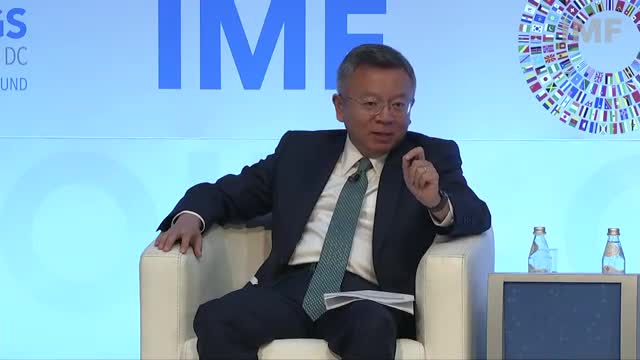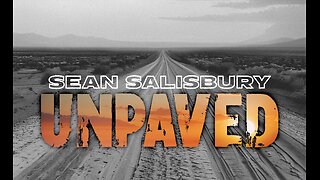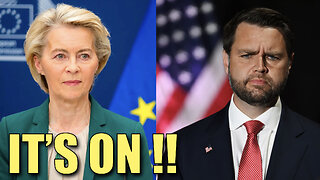Premium Only Content

IMF Chief: Digital Currency will control what people can and cannot buy
The Chinese CCP is now running the banks, and are soon running your lives. Bo LI assumed the role of Deputy Managing Director at the IMF on August 23, 2021. He is responsible for the IMF’s work on about 90 countries as well as on a wide range of policy issues. Before joining the IMF, Li worked for many years at the People’s Bank of China.
On Friday 14th October, the IMF streamed a meeting called “Central Bank Digital Currencies for Financial Inclusion: Risks and Rewards.”
Speakers were Her Majesty Queen Máxima of the Netherlands, who’s also the UN Secretary-General’s Special Advocate for Inclusive Finance for Development. Kristalina Georgieva, Managing Director, IMF, and Bo Li, Deputy Managing Director, and finally Cecilia Skingsley the BIS Innovation Hub Director.
The meeting was about global financial inclusion, which they said had improved over the past ten years, but almost a quarter of the world’s adult population are still unbanked.
It’s hoped that central bank digital currencies would be affordable, widely accepted, and safe instruments, which would address some of the issues surrounding financial inclusion, among other things.
The live stream went under the radar for many but our buddy Tim Hinchliffe over at The Sociable kept an eye on what was going on. Tim posted a video of Bi Li, the Deputy Managing Director of the IMF, explaining how CDBSs can be programmed.
He said: “The smart contract would allow targeted policy functions, like welfare payments, consumption coupons, food stamps, etc.”
“With CBDCs, we can precisely control what people can and can’t own. Also, what kind of use this money can be programmed for, like food only.” – Bi Li
The key word he used was programmability.
Bo li went on to say that because of this potential programmability, government agencies could precisely target support packages to the right people.
He went on to say that: “CBDCs can’t solve every financial inclusion challenge, but they can work together with financial literacy and digital literacy.”
So, a CBDC would work with other policies like digital identities and digital wallets.
This goes hand in glove with what the World Bank Group described in November 2021. “Digital identity verification is essential to the operation of CBDCs, particularly in cross-border transactions. “
“Tradable digital assets must be tied to a digital identity system, which in turn should be tied to an automatic KYC and AML/CFT verification system.“
“This is a foundational step to the potential use of CBDCs, and emerging developments in regulatory and compliance technology may benefit central banks’ experiments in the digital currency space.”
Bo li described a CDBC as an eco-system, and that the data it would produce would be very valuable to third parties.
When questioned on how this transactional data could be used, Bo Li explained: “I can give you one example in China, those transaction data can be utilised by service providers in credit underwriting.”
Underwriting is the process by which the lender decides whether an applicant is creditworthy and should receive a loan.
“Those transaction data in terms of how many coffees I drink every day, where I buy coffee, do I use UBER every day and what kind of working hours I have.”
“Those non-traditional data can be very useful for financial service providers to give me a credit score and based on that credit score the service providers can give me a credit line without any face-to-face due diligence.”
He continues to say that this “will create value in addition to finance and that data can be very profitable, and that’s the value we are talking about to make it attractive to private sector players to join this eco system.”
It’s like the Chinese model, but every country has the option to do it differently. There is limited privacy. The IMF, World Bank, and BIS are also managing many central banks on these new products.
On the issue of data privacy, Cecilia Skingsley the BIS Innovation Hub Director explained:
“What we just heard from Bo about credit scoring was a very good example of how different countries will take different journeys to a ‘new world’ where they serve their societies in the digital space.”
“We will all have different preferences and this preference on privacy or anonymity is tricky”.
And she continued to say, “That its worth to give up a little bit of privacy to get security”.
Let’s not forget that earlier this year at the World Government Summit aptly titled a ‘New World Order’, the economist Pippa Malmagren dropped the beans saying that:“We are on the brink of a dramatic change; we are about to abandon the traditional system of money and replace it with a new one, Digital Blockchain CBDC, which will give us greater clarity over every single transaction.”That’s right every single transaction would be made available to the Central Banks and their private service providers for this credit scoring.
-
 LIVE
LIVE
StoneMountain64
2 hours agoHUNTING FOR THE FIRST WIN BACK ON WARZONE
251 watching -
 1:13:02
1:13:02
Simply Bitcoin
3 hours ago $1.51 earnedINSIDER CONFIRMS 1M Bitcoin Buy INCOMING!! | EP 1319
33.9K -
 1:03:00
1:03:00
Sean Unpaved
2 hours agoCFB Deep Dive: Matt Moscona's Expert Takes on the Gridiron
27.9K -
 27:39
27:39
Crypto.com
1 day ago2025 Live AMA with Kris Marszalek, Co-Founder & CEO of Crypto.com
99.6K6 -
 LIVE
LIVE
SternAmerican
23 hours agoElection Integrity Call – Wed, Aug 27 · 2 PM EST | Featuring Arizona
278 watching -
 1:00:05
1:00:05
Timcast
3 hours agoMASS SHOOTING At Catholic Church In Minneapolis, Children Reportedly Targeted
154K85 -
 1:34:01
1:34:01
Tucker Carlson
1 hour agoChristopher Caldwell: Is It Too Late to Save the English-Speaking World?
31.3K41 -
 2:14:40
2:14:40
Steven Crowder
5 hours agoBreaking: Minneapolis Catholic Church Shooting Live Coverage
357K317 -
 LIVE
LIVE
Major League Fishing
5 days agoLIVE! - Fishing Clash Team Series: Challenge Cup - Day 4
236 watching -
 25:03
25:03
Neil McCoy-Ward
2 hours agoFURY As JD Vance Unleashes HELL On The UK & EU… (What We Know So Far)
12.6K11